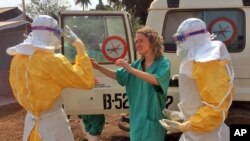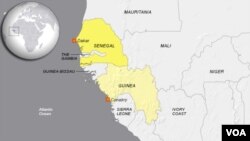DAKAR, SENEGAL —
Guinea’s Ministry of Health says eight cases of the Ebola virus have been confirmed in the capital, Conakry. Aid organizations say the spread of Ebola to the city poses new challenges for those trying to contain the outbreak.
West Africa’s first ever outbreak of the Ebola virus, which began in Guinea’s southeastern forest region last month, is spreading.
Guinea’s Ministry of Health said eight people have tested positive for the virus in Conakry. One person has died.
The World Health Organization (WHO) confirmed that there have been eight suspected cases in Liberia, including six fatalities. In Sierra Leone, six people are believed to have contracted Ebola. Five of them have died.
This brings the total number of suspected cases to 125, including 81 deaths.
Roland Berehoudougou is the regional head of Disaster Risk Management for the humanitarian organization Plan International.
“As you know, Conakry is the biggest city of the country and people are really - it’s a very crowded city. So the issue now is how to prevent people from getting contaminated and really cope with this situation and control the epidemic in this specific place," he spoke to VOA from Conakry.
Nearly two million people currently call Conakry home. Many of them reside in slum areas, where living conditions are poor. Throughout much of the city, there is a widespread lack of access to water and sanitation.
Berehoudougou said this could increase the speed with which the outbreak spreads.
The Ebola virus, which is one of the most contagious viral diseases, is spread through contact with bodily fluids, such as sweat, blood and saliva, of an infected person or animal.
There are no known vaccines or treatments available for Ebola. The only way to stop its spread is by preventing further infections.
Last week, when the epidemic was still contained to Guinea’s forest region, the government forbid the sale and consumption of bats and bat meat. Bats are believed to be a natural host of the Ebola virus and could be contributing to its spread.
Berehoudougou said that while this was an important prevention measure in rural areas, proper hygiene was the best way to control an outbreak in an urban center, such as Conakry.
“In Conakry, people here don’t really eat a lot of white meat, so the animal-to-human [transmission] is a less serious issue than human-to-human contamination. As you know, the disease is transmitted by human secretions, body secretions. So having good individual hygiene will prevent people from transmitting the disease and also from getting it from others," he said.
Aid organizations are now working with the government to educate Conakry’s residents about proper hygiene measures, such as hand washing and food preparation, using local radio, TV and text messages.
On Friday, the Ministry of Health urged people to immediately report any suspected cases of Ebola and not to touch anyone - alive or dead - who is suspected of having the virus.
Health centers in Conakry are now offering treatment for all suspected Ebola cases free of charge.
West Africa’s first ever outbreak of the Ebola virus, which began in Guinea’s southeastern forest region last month, is spreading.
Guinea’s Ministry of Health said eight people have tested positive for the virus in Conakry. One person has died.
The World Health Organization (WHO) confirmed that there have been eight suspected cases in Liberia, including six fatalities. In Sierra Leone, six people are believed to have contracted Ebola. Five of them have died.
This brings the total number of suspected cases to 125, including 81 deaths.
Roland Berehoudougou is the regional head of Disaster Risk Management for the humanitarian organization Plan International.
“As you know, Conakry is the biggest city of the country and people are really - it’s a very crowded city. So the issue now is how to prevent people from getting contaminated and really cope with this situation and control the epidemic in this specific place," he spoke to VOA from Conakry.
Nearly two million people currently call Conakry home. Many of them reside in slum areas, where living conditions are poor. Throughout much of the city, there is a widespread lack of access to water and sanitation.
Berehoudougou said this could increase the speed with which the outbreak spreads.
The Ebola virus, which is one of the most contagious viral diseases, is spread through contact with bodily fluids, such as sweat, blood and saliva, of an infected person or animal.
There are no known vaccines or treatments available for Ebola. The only way to stop its spread is by preventing further infections.
Last week, when the epidemic was still contained to Guinea’s forest region, the government forbid the sale and consumption of bats and bat meat. Bats are believed to be a natural host of the Ebola virus and could be contributing to its spread.
Berehoudougou said that while this was an important prevention measure in rural areas, proper hygiene was the best way to control an outbreak in an urban center, such as Conakry.
“In Conakry, people here don’t really eat a lot of white meat, so the animal-to-human [transmission] is a less serious issue than human-to-human contamination. As you know, the disease is transmitted by human secretions, body secretions. So having good individual hygiene will prevent people from transmitting the disease and also from getting it from others," he said.
Aid organizations are now working with the government to educate Conakry’s residents about proper hygiene measures, such as hand washing and food preparation, using local radio, TV and text messages.
On Friday, the Ministry of Health urged people to immediately report any suspected cases of Ebola and not to touch anyone - alive or dead - who is suspected of having the virus.
Health centers in Conakry are now offering treatment for all suspected Ebola cases free of charge.





